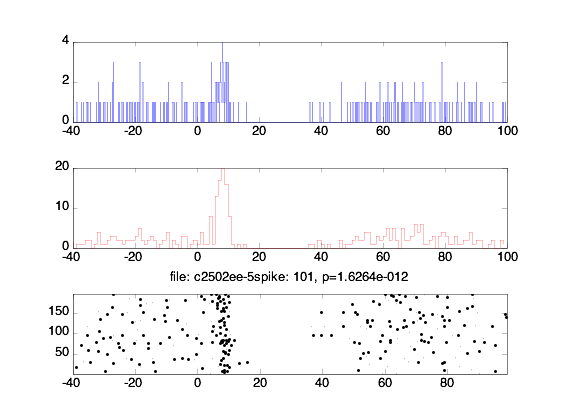What about the lab work?
From May to August I worked in Yifat Prut's lab, sitting at a computer all day and analyzing recordings taken from the monkeys Hugo and Chalva years ago. They were cortical recordings from the primary, supplementary, and premotor cortexes with stimulation I think in the peduncle, thus looking at the cerebellothalamocortical motor pathway. From this data, I sorted out "single unit" responses from the multi unit activity using various programs created in Matlab. After sorting, I analyzed the single unit spikes and grouped them according to the response pattern of excitation/inhibition after stimulation.
Examples of what my analysis process looked like:





This lab was good for me because I learned some basics of Matlab and programming and by the end I created my own simple program that calculated correlation and p-values, and produced graphs! That was an amazing accomplishment for me, who seems to have no intuitive inclination towards programming.
September-January: Adi Mizrahi's lab working specifically with Yoav Livneh. This lab was much better for me because I was able to plan and conduct my own experiments with little supervision other than being trained. I studied neurogenesis in olfaction, particularly adult-born granule cells and their spine density and synaptophysin (marker of presynaptic activity, thus how well these new granule cells are making connections with other cells) in enriched areas.
So, I took my little MOL2.3 mice with several GFP-labeled glomeruli in the olfactory bulb, and I injected a lentivirus with GFP-synaptophysin into the rostral migratory stream to label those adult-born neurons. This surgery was nuts! I actually performed brain surgery, opening up their head and drilling holes into their little mouse skulls and injecting a virus, and almost all my mice lived from it! Then for weeks or months I gave these mice a specific odor in their cages so that the labeled glomeruli would be "enriched". When the enrichment period was up, I perfused (opened up the chest cavity and injected paraformaldahyde into their hearts, thus killed them) the mice, sliced up the brains, and performed immunohistochemistry to enhance my GFP signals. I mounted the slices on microscope slides and then took pictures of the neurons with Naomi at the confocal microscope. Finally, I analyzed the data, tracing dendritic segments and counting spine heads to figure out the density. Phew! It was a lot of work and the results were mildly satisfactory, but I learned good techniques and good patience working with all those abrupt Israelis! No one seemed to ever have the time or the desire to help me but I forged through and "completed" my project that Adi and Yoav told me was impossible to finish in my short time. It was a good feeling.
From May to August I worked in Yifat Prut's lab, sitting at a computer all day and analyzing recordings taken from the monkeys Hugo and Chalva years ago. They were cortical recordings from the primary, supplementary, and premotor cortexes with stimulation I think in the peduncle, thus looking at the cerebellothalamocortical motor pathway. From this data, I sorted out "single unit" responses from the multi unit activity using various programs created in Matlab. After sorting, I analyzed the single unit spikes and grouped them according to the response pattern of excitation/inhibition after stimulation.
Examples of what my analysis process looked like:
This lab was good for me because I learned some basics of Matlab and programming and by the end I created my own simple program that calculated correlation and p-values, and produced graphs! That was an amazing accomplishment for me, who seems to have no intuitive inclination towards programming.
September-January: Adi Mizrahi's lab working specifically with Yoav Livneh. This lab was much better for me because I was able to plan and conduct my own experiments with little supervision other than being trained. I studied neurogenesis in olfaction, particularly adult-born granule cells and their spine density and synaptophysin (marker of presynaptic activity, thus how well these new granule cells are making connections with other cells) in enriched areas.
So, I took my little MOL2.3 mice with several GFP-labeled glomeruli in the olfactory bulb, and I injected a lentivirus with GFP-synaptophysin into the rostral migratory stream to label those adult-born neurons. This surgery was nuts! I actually performed brain surgery, opening up their head and drilling holes into their little mouse skulls and injecting a virus, and almost all my mice lived from it! Then for weeks or months I gave these mice a specific odor in their cages so that the labeled glomeruli would be "enriched". When the enrichment period was up, I perfused (opened up the chest cavity and injected paraformaldahyde into their hearts, thus killed them) the mice, sliced up the brains, and performed immunohistochemistry to enhance my GFP signals. I mounted the slices on microscope slides and then took pictures of the neurons with Naomi at the confocal microscope. Finally, I analyzed the data, tracing dendritic segments and counting spine heads to figure out the density. Phew! It was a lot of work and the results were mildly satisfactory, but I learned good techniques and good patience working with all those abrupt Israelis! No one seemed to ever have the time or the desire to help me but I forged through and "completed" my project that Adi and Yoav told me was impossible to finish in my short time. It was a good feeling.


No comments:
Post a Comment